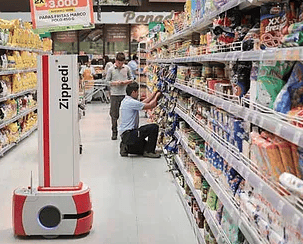
Por Jacob Atkins
octubre 28, 2019
Contxto – If you work in the retail or grocery industry, you’re surely aware of how often inventories disappear. Warehouses may miscalculate shipments, but shelf items can also vanish one way or another.
Identifying this issue, the Chilean startup Zippedi believes that the solution rests in AI. Currently based in California, recently it launched Bruno in Chilean supermarkets. With support from Magical Startups as well as Chile’s Corporation for the Promotion of Production, Bruno is a digital “gondola” assistant improving inventory management.
Standing at 70 centimeters and weighing 30 kilos, like a gondola pole, the machine leverages AI to detect incorrect labels, missing prices, insufficient stock, and even misplaced items.

What some call «phantom inventory» lays at the center of this problem. That is, previously accounted inventory missing from the shelves. These incognito stock items can cost companies hefty financial losses.
To curb this, Bruno is a collaborative chatbot platform between retailers and suppliers. Equipped with machine learning, it can monitor shelves to maintain stock, avoid breakage, among other features. In turn, the data that Bruno gathers helps companies analyze sales more efficiently and prevent phantom inventory.
“Today, with the advent of machine learning models, sales can be analyzed and this can help detect availability problems with a certain degree of effectiveness, particularly for products with very high turnover,” said Ariel Schilkrut, co-founder of Zippedi.
“However, for most products, this approach is impractical because these detections are far from being in real-time and because of the high number of false positives.”
Imagine that at the beginning of your work shift, you input the list of products that Bruno must replace. Once you program the items, Bruno goes back into the warehouse to retrieve them.
Once collected, another programmer inputs the location of these new items. Following suit, then Bruno delivers the stock back to stores exactly where it belongs. With a little teamwork from humans to designate Bruno’s trajectory, the device can truly make the process more efficient.
Besides using an operative chatbot format, Bruno also leverages high-resolution cameras and various sensors to effectively maneuver itself. Resembling a gondola role, the robot consisting of a sensor tower generates real-time information while controlling inventories and reducing financial losses.
Trackable data includes inventory stock prices, product location, as well as the implementation of sales and promotions. Although Zippedi works in the United States, its team has Chilean origins, specifically computer science students and scientists from the Pontifical Catholic University in Santiago.
Zippedi is a Chilean startup operating in the United States developing AI-solutions for retailers. Following three years of research, the group created the first Chilean AI-operated robot for grocery stores to better maintain inventories.
«The robot is an example of the great capacity of national engineering and the virtuous cycle that occurs when University, State and private sector align to create world-class technologies that benefit the country,» said Álvaro Soto, professor of UC Engineering who originally led the project.
Rather than seeking to replace supermarket operators, Zippedi hopes to support them in facilitating complex tasks and reducing errors. So far, it has operated in Brazil, Colombia, Ecuador, the United States, and now Chile.
Cencosud, Walmart, Tottus and Home Center are some of the major retailers in Chile that Zippedi will work with, according to Schilkrut in recent email correspondence. Based on our conversation, the company is focusing on solidifying its presence in Colombia and pursuing operations in Mexico.
All the while, the main target for Zippedi is the United States. While the startup has deployed Bruno in the top-five U.S. retailers, Schilkrut couldn’t disclose their names at this moment.
-JA
julio 22, 2024
julio 16, 2024